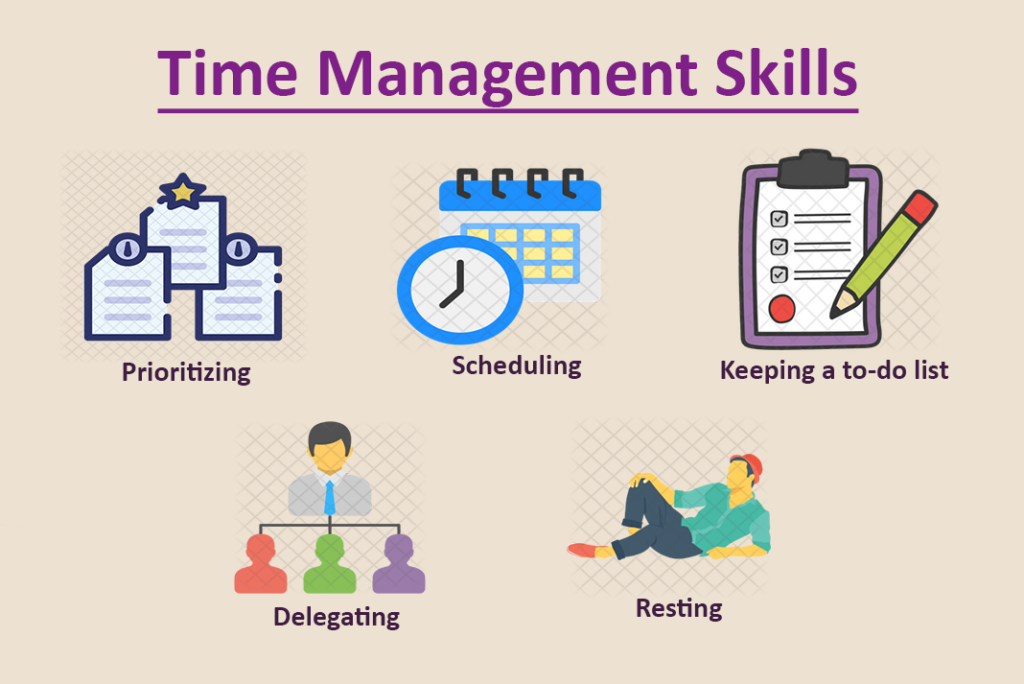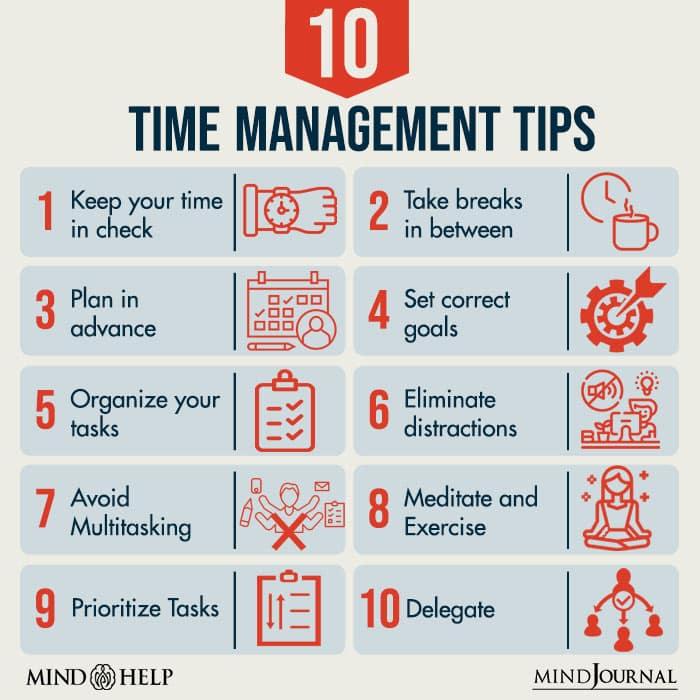Late for work, and you’ve piled up work because of procrastination? Rather than allowing time to control you, take control of it. Here’s how to improve time management at home or at work.
Everyone has different skills and abilities, but everyone gets the exact same amount of hours in a day. That’s why time has been dubbed “the ultimate equalizer.” So if you really want to get ahead, focusing on time management best practices will be hours well spent.
Time has been dubbed “the ultimate equalizer.” So if you really want to get ahead, focusing on good time management practices will be hours well spent.
There is time management “hacks” galore. But I’m not interested in a specific system—everyone is unique and needs something different. Instead, offered below is my interpretation of what the social science research suggests are the four overarching, universal best practices in time management.
What Are Time Management Skills?
Before outlining the four practices, it’s important to first understand the end goal of time management. Meta-analytic evidence (based on an aggregated study of studies) suggests that the impact of time management on performance is weak at best. So why do it? Because time management is strongly associated with a host of well-being indicators such as stress, job satisfaction, and work-life balance. Time management can help us to remain productive without unnecessary strain.

4 Tips To Improve Time Management And Use Your Time Wisely
1. Filtering Comes First
Ironically, the most important thing you should do with respect to time management has nothing to do with managing your time. No matter how amazing your time management system or how disciplined you are, if you let too many things in on the front end, you’ll never have enough time to get everything done on the back end. That’s why the most important thing you can do is filter out what you will not put on your task list or calendar.
Ask For Details. Never commit to a task, project, or partnership outright. How much time will it take? Is there a firm end date or deliverable or is this an ongoing ordeal? Thinking through these questions will ensure that this a worthwhile investment of your time.
Say No. Evaluate whether initiatives align with your goals. If you’re not sure, make a calendar item for a later date to re-evaluate. If the task or event involves others, be honest; there’s nothing wrong with a professional “, no thank you.” It’s better than a relationship gone sour.
Availability. Be transparent with others about how much time you have available and how much time you are willing to commit. Also, try to uncover whether you are aligned on work pace. Do you have the same sense of urgency? How often will you need to check in?
Read 12 Things First-Time Leaders Need To Succeed
2. Stay Inside The System
The majority of time management suggestions revolve around having specific systems in place. Keep in mind that it’s not the system that helps, but the habits that the system reinforces.

Don’t Let Anything Fall Through the Cracks. Having a system of tasks and calendar items is fine, but it isn’t enough. Anything and everything that enters your mind—ideas, notes, feedback, etc.—needs to go into one system. These miscellaneous items tend to be random and messy. Spend time translating and organizing them so that they can be incorporated into your task list and schedule.
Regularly Scheduled Reconciliations. Once you have a system, the next step is to regularly reconcile everything in your system. Most people do this daily, but it’s also helpful to do this weekly, monthly, and annually to make sure you’re reprioritizing based on how things have developed. When you do, be sure to scrutinize everything. Refresh tasks so that they are more relevant, and don’t mindlessly push tasks to a later date.
Read Change Management: in your personal and business life
3. Prioritize First, Act Second

We’re pretty good at getting things into our system, but we’re really bad at prioritizing what’s in the system. Although many prioritization schemes are out there, perhaps the most timeless is the urgency-importance framework. This leads to four possible scenarios.
- Not Urgent- Not Important. Don’t do it. It’s better to delete something off your task list and chip away at something important than to finish an unimportant task.
- Urgent– Not Important. Try not to do it. Delegate to others or push back against those that are trying to get you to do it. Keep in mind that although it might not be important to you it might be important to them, so tread lightly.
- Urgent-Important. Do it now. The key is to make sure that it is indeed important.
- Not Urgent-Important. Make time to do it. More often than not, these are deep-thinking tasks that we never can find the time to tackle. Interestingly, these are also the tasks that are probably in our long-term best interest. Schedule time to make it happen.
4. Be Strategic About Being A Manager Or A Maker
One way to ensure that you are using your time wisely is to pay attention to the differences between being a manager and a maker.
Manager. When you are in manager mode: (a) you are talking, problem-solving, and thinking quickly, (b) you are most productive when allocating time in units of 5 to 15 minutes, (c) your ideal state of consciousness is mindfulness (broad, present-moment attention), and (d) the cost of being in meetings is low.
Maker. When you are in maker mode: (a) you are alone, creating, and thinking slowly, (b) you are most productive when allocating time in units of 2 to 4 hours, (c) your ideal state of consciousness is flow (narrow, present-moment attention), and (d) the cost of being in meetings is high.
Unavailable. When carving out time to act as a maker, there are several mechanisms for making yourself unavailable. Out of office assistants, turning off text and Slack alerts, putting signs on closed doors, etc. Think strategically, experiment, and communicate with colleagues (or family) to explain why you don’t want to be distracted.
Be Careful With Online Scheduling Tools. When planning out time to be in manager mode, be strategic in how you set meetings. If time is money, scheduling meetings is a negotiation, and the goal is to win. Instead of giving out your schedule through Calendly, MixMax, or the like, tell other people when you want to meet. This will ensure that you manage your time and energy in ways that allow you to be more productive.
Read 4 Toxic Habits That Cause Energy Leaks In Your Life
Keep in mind that trying out different systems is fine, but the key is to develop good habits that allow you to stay on top of things over the long term. Focus on filtering on the front end, staying inside one system, regularly reprioritizing, and being strategic with your manager and maker time.

Consider taking my free, validated, and theoretically grounded assessment, “How Well Do You Manage Your Time.” This 12-question assessment will automatically generate your scores and a comparison to your peers.
We hope you learn how to improve time management at home. So use your time wisely and hare this article with anyone who you may think will find it valuable and helpful.
If you want to know more about how to improve time management, here’s a video to help you out:
References
1. Claessens, B. J., Van Eerde, W., Rutte, C. G., & Roe, R. A. (2007). A review of the time management literature. Personnel Review.
2. Gaskin, J. E., & Skousen, T. (2016). Time-chunking and hyper-refocusing in a digitally-enabled workplace: six forms of knowledge workers. Frontiers in Psychology, 7, 1627.
3. Macan, T. H. (1994). Time management: Test of a process model. Journal of Applied Psychology, 79(3), 381.
Written by: Scott Dust, Ph.D
Originally appeared on: Psychology Today
Republished with permission
Frequently Asked Questions (FAQs)
How to improve time management?
To improve time management and boost productivity the key is to develop good habits that allow you to stay on top of things over the long term.
What are 5 time management strategies?
To improve time management there are 5 important strategies like keeping a to-do-list, prioritizing, scheduling, delegating and resting.
Why time management is important?
Time management strategies are important because it makes it easier for you to manage your tasks and guarantees that you have adequate time to finish each project.
How can student improve time management skills?
Students can improve time management by avoiding procrastination and distractions. They can set clear goals between their study sessions.
How can I improve my time management skills?
Start your duties by establishing deadlines to enhance your time management skills. Give yourselves breaks while prioritizing important tasks. Lastly, organize your work environment.










Leave a Reply
You must be logged in to post a comment.